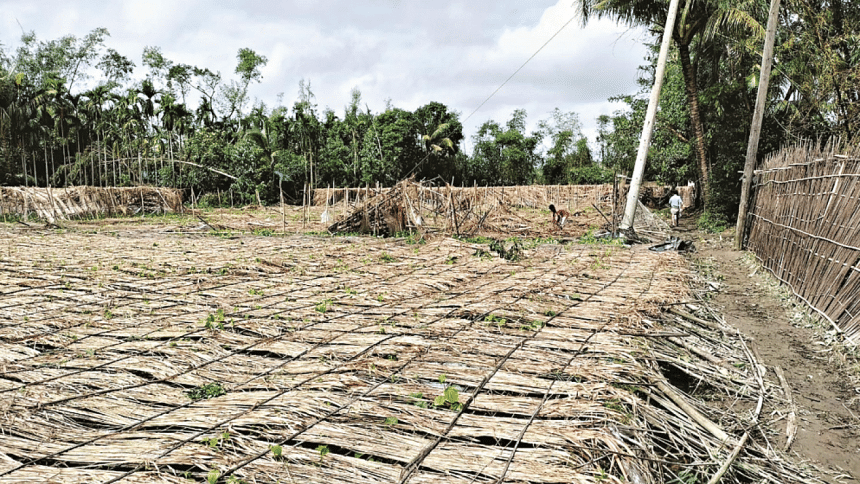Betel leaf farmers in Moheshkhali devastated by Cyclone Hamoon

Farmers in the Moheshkhali upazila of Cox's Bazar, famed for its evergreen betel leaves, were the worst sufferers of Cyclone Hamoon, leaving them staring into the abyss as they wonder how to cover up massive losses.
Betel leaves are cultivated across the country in regions such as Khulna, Barishal, Shatkhira and Rajshahi due to their nature as a high-value crop.
Most of those areas were largely unaffected by Cyclone Hamoon, which blew mainly over Cox's Bazar town and the Moheshkahli, Kutubdia and Chakaria upazilas, denting the local economy which is driven by betel leaf cultivation.
Of the 1,600 hectares of land where betel leaf was being cultivated in Moheshkhali, 1,050 hectares were partly damaged while 125 hectares were completely damaged by the cyclone, according to the Department of Agricultural Extension (DAE).
This affected around 4,500 betel leaf farmers.
"Cyclone Hamoon did massive damage to my crops," lamented Momtaz Ahmed, a farmer of Borochora village under Hoanak union of Moheshkhali.
Betel leaves across 20 decimals of his land were ruined, leading to losses of Tk 1.2 lakh. His cucumber field across four bighas was also damaged, bringing his total losses to around Tk 3.5 lakh.
"I have lost every crop I had prepared. Now I don't know how to cover it up," he told The Daily Star.
Shafiul Alam, a farmer from Nirjhirpara under Kalamarchhara union of Moheskhali, said he had planted betel leaves at a cost of Tk 85,000 across 10 decimals of land which were damaged by the cyclone.
"I spent Tk 20,000 more to repair half of the field but the rest was ruined," he said.
"This year I will hardly get 50 percent of the yield against my expected production," he added.
Younis Hazi, deputy assistant agriculture officer of Hoanak union, said betel leaves and other crops in his union were severely damaged.
"Many farmers have lost their last resources in the cyclone," he said.
"Many of them cultivated crops after taking loan from NGOs and they are now in serious trouble after losing their crops," he added.
In the district, crops, mainly Aman paddy, betel leaf and winter vegetables planted across 6,275 hectares, were partly damaged by the cyclone while 206 hectares were completely damaged, affecting a total of 11,644 farmers in the district, showed a DAE report.
Md Kabir Hossain, deputy director of Cox's Bazar DAE, said affected farmers would be taken under government incentive programmes.
On October 24, cyclone Hamoon battered Cox's Bazar. Three people lost their lives in the disaster and around 38,000 homes were partly or completely damaged.

 For all latest news, follow The Daily Star's Google News channel.
For all latest news, follow The Daily Star's Google News channel. 






Comments